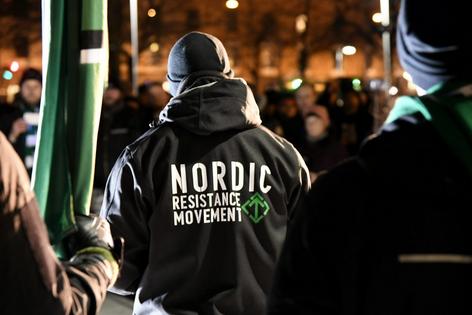US’s terrorist listing of European far-right group signals fears of rising threat − both abroad and at home
Published in News & Features
The rise of the radical far right in Europe poses a threat not only to the continent but also to Americans at home and abroad.
But while the U.S. government tends to be quick to use sanctions against perceived bad actors across the globe, when it comes to the transnational threat that far-right violence poses, successive U.S. administrations have been more coy about using another critical and effective tool: terrorist designations.
It wasn’t until mid-June 2024 that the Biden administration’s State Department sanctioned its first violent far-right group, the Nordic Resistance Movement. A neo-Nazi group based in Sweden but with a footprint that extends throughout Scandinavia, the NRM has built a reputation for brutality and espousing a vision of totalitarian rule. As the State Department noted in its designation, the group is also stockpiling weapons and explosive materials.
Prior to the Nordic group’s listing as a terrorist entity, the Trump administration designated the far-right Russian Imperial Movement as a terrorist group in 2020.
Both groups are now officially deemed “specially designated global terrorists” by the United States. As a result, the groups are subject to an asset freeze, and anyone trying to support them risks prosecution for financing terrorism.
As a former State Department counterterrorism official with more than a decade of experience sanctioning terrorists under U.S. law, I know that it’s no accident that the groups U.S. officials are targeting now are based in Europe rather than in America.
The threat posed by violent far-right actors is certainly as serious in Europe as in the United States. But United States agencies do not have authority to legally sanction groups such as the U.S.-based Oath Keepers, Proud Boys or the Atomwaffen Division as terrorists.
Constitutional rights that protect freedom of speech, assembly and the right to bear arms make it exceedingly difficult to sanction domestic groups. Further, all of the relevant executive orders and statutory laws in the anti-terrorism space are explicit that the State Department must designate foreign-based groups.
With limited power to crack down on far-right groups in the U.S., agencies are instead looking to curtail the influence of violent far-right ideology from overseas.
Yet the designations of only two violent far-right groups as “specially designated global terrorists” – separated by four years – is disappointing to me, especially when considering the range of far-right threats that dot the European continent.
...continued








Comments